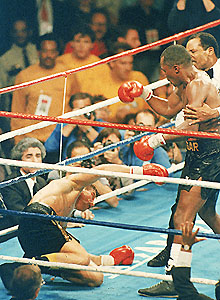 Sugar Ray Leonard’s depiction of himself in his upcoming autobiography is hardly flattering. He describes himself as a philandering husband, an absentee father and a substance abuser. Perhaps most shockingly, he revealed he was sexually abused by a prominent, but unnamed, boxing coach while preparing for the 1976 Olympics in Montreal. He was hardly the All-American boy that his carefully crafted image portrayed him to be.
Sugar Ray Leonard’s depiction of himself in his upcoming autobiography is hardly flattering. He describes himself as a philandering husband, an absentee father and a substance abuser. Perhaps most shockingly, he revealed he was sexually abused by a prominent, but unnamed, boxing coach while preparing for the 1976 Olympics in Montreal. He was hardly the All-American boy that his carefully crafted image portrayed him to be.“I’ve done a lot of things in my life that I’m not proud of,” Leonard said soberly during a telephone interview.
He goes into great detail about them in his new book, “The Big Fight: My Life In and Out of the Ring,” co-written with Yahoo! Sports writer and editor Michael Arkush, not out of any sense of duty, but out of a desire to lift a burden from his own back.
Clearly, though, this is no self-help tome. Leonard, 55, didn’t write to help lift the spirits of the downtrodden who are battling the demons he once did. If it is a self-help book, it was written to help one man: Ray Charles Leonard.
“I finally got to a point in my life where I wanted to be totally transparent with my family, my wife, my kids and let go of that burden of pain that I carried inside of my chest for so long,” Leonard said.
This book isn’t the first time he intended to tell the story. More than three decades ago, Leonard hired Pat Putnam, one of the greatest sports writers of the time, to tell his tale.
Leonard, though, couldn’t bring himself to commit to the project and it was eventually scrapped. He was unable to address two separate instances of sexual abuse, because he hadn’t come to terms with them himself.
It was difficult even decades later, long after the coach who allegedly had abused him had died. He said he began to discuss it with Arkush, but couldn’t go into the details. At first, Leonard says, he told Arkush a sanitized version of the story.
He wrote that it wasn’t until he saw actor Todd Bridges on “Oprah” that he decided to write the entire truth.
In the book, he describes the abuse by writing he was in a car across from a recreation center with an Olympic coach. They were ostensibly there to discuss the significance of a gold medal.
“Before I knew it, he had unzipped my pants and put his hand, then mouth, on an area that has haunted me for life,” Leonard wrote. “I didn’t scream. I didn’t look at him. I just opened the door and ran.”
Leonard has been perceived as a heroic figure in boxing since winning the gold medal in 1976 and going on to a career in which he’d defeat legendary fighters such as Marvelous Marvin Hagler, Roberto Duran, Thomas Hearns and Wilfred Benitez, among many others.
But there is nothing heroic about making an allegation such as he did and then failing to name names. It creates needless speculation about who did it and innocent people, who presumably only helped Leonard and assisted him on his way to superstardom, have become suspect.
Leonard, though, insists he’s handled it appropriately and doesn’t believe he’s necessarily cast aspersion upon innocent men.
“The people who are innocent, they know they’re innocent and they won’t even think of it, precisely because they’re innocent,” Leonard told Yahoo! Sports. “The people who are the perpetrators, if I would say their names, reveal their names, that would cause a lot of pain and suffering for their families and their kids. I didn’t think I had to do that. I could state what happened to me without going further and naming names and creating more pain for anyone else.”
Leonard said he told his first wife, Juanita, about the abuse, but that she didn’t respond in a way that would encourage further discussion. He said he later told his current wife, Bernadette, at a time when he’d had too much to drink.
Leonard, who said he hasn’t consumed either drugs or alcohol in nearly five years, said he resorted to substance abuse as a way of making the pain and the embarrassment he felt over the sexual abuse go away.
“When you’re a boxer, there is a lot of downtime and long periods of inactivity,” Leonard said. “The drugs I took and the alcohol I consumed, they were my own way of putting a Band-Aid on things. They were a long-term Band-Aid. That’s what I felt like. I was an emotional wreck and I needed something to help me.”
Leonard, who said he had wanted to go to the University of Maryland and pursue a career as an X-ray technician rather than becoming a boxer, said counseling has enabled him to come to terms with his past.


No comments:
Post a Comment